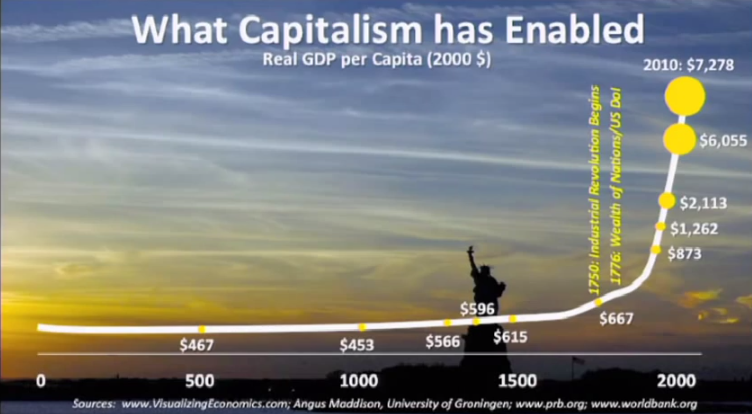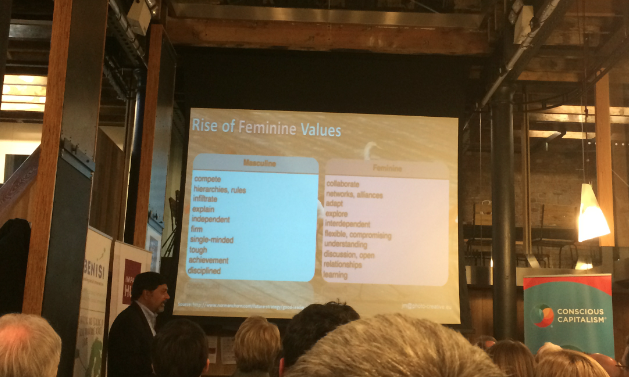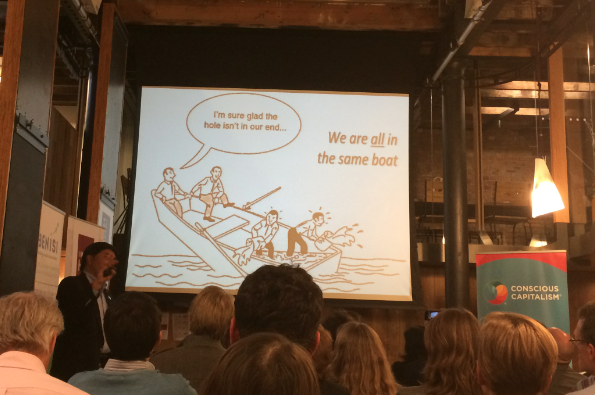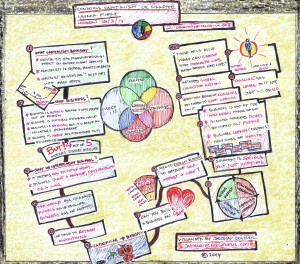Last night I had the good fortune to hear Raj Sisodia at the launch of the Conscious Capitalism UK Chapter. Raj is co-author of Conscious Capitalism: Liberating the Heroic Spirit of Business (with John P. Mackey, co-founder and co-CEO of Whole Foods Market). The book was published by Harvard Business Review Press in 2013, and rose to #2 on the Wall Street Journal Business Bestseller list.
What struck me most about Raj’s talk and his book is his optimism. Taking a long term view of GDP he argues that ultimately business is good, pulling people out of abject poverty:
He goes on to say that:
- Business is good because it creates value
- Business is fundamentally ethical because it is based on voluntary exchange
- Business is noble because it elevates our existence (for example funding and creating time for artistic pursuits)
- Business is heroic as it lifts people out of poverty (in a more sustainable way than fund dependant NGOs)
His call is to change the toxic narrative that pervades society – that of business being a force of bad, when in fact it has great power to be part of the solution to many of the world’s problems.
How can business to do this? One of the key challenges is the fact that the world has changed a huge amount in a very short period of time. And businesses have not adapted quickly enough and so are operating using obsolete structures – largely based on an out-of-date military model and language.
Raj points to 1989 as a key year for demonstrating change in the world. It was the year that:
- The Berlin Wall came down marking the end of the Cold War.
- The student led Tiananmen Square protests and massacre shocked TV sets across the world.
- A fatwa was issued by Iran against Salman Rushdie for his book The Satanic Verses.
- The median age in the USA reached 40, signifying a ‘midlife crisis’ in terms of the nations psychological centre of gravity, increasing questioning around meaning and purpose in the world.
- Tim Berners-Lee invented the World Wide Web.
This last change has had wide spread implications: we are now better informed, better connected, better educated (women especially), and more intelligent (with underling IQ on the rise) allowing us to better deal with complexity. The rise of better educated women in turn means that there is increased emphasis on feminine values, with increased focus on collaboration and relationship.
Despite the impression that the media is creating, we are also more peaceful than ever before. We are also more conscious, with greater awareness about the impact of our decisions and lives, allowing us to make better decisions.
Sigmund Freud commented that “love and work are the corner stones of our humanness.” Can we build businesses on love rather than fear? We should at least try. And there are examples: Raj highlights Whole Foods Markets as a business “built on love and care rather than fear and stress.”
The question is not around whether profit is good or not – it creates sustainable organisations that can make a positive impact in the world. Rather it is around HOW you make money.
Business is not a game (there is too much at stake). Business is not a war (competitors are not enemies to be killed, or customers targets to be caught). Business is not a machine, or a maths problem designed to maximise one thing.
Business. Is. One. Of. The. Most. Human. Things. We. Can. Do.
As well as profit, measuring success needs to be based on widespread impact, acknowledging the many different types of wealth that a business can create and destroy: financial, intellectual, social, emotional, spiritual, physical and natural.
Ultimately we need to acknowledge that we are all in the same boat after all.
The main source of hope comes from the fact that humans are not finite resources that expire after use like fossil fuels. By contrast we are an ongoing source. The challenge for business is how to create the right conditions to release that source and draw on the best of humanity.
So how do we actually do this? This was touched on in the Q&A session where Raj was also joined by Rajiv Joshi and Richard Barrett.
The start of the journey towards more conscious business can come in several forms. Perhaps with an awakened leader, a wake up call (the processed food CEO whose grown up children refused to eat the products the company made), or a journey into purpose. The underlying essence tends to be the same – an increased focus on service rather than pure self interest. It is notable that Adam Smith also spoke of the primal drive of caring, as well as self interest – and that it is the latter that up to this point has had the most attention.
Raj spoke of his commitment to to building awareness about the importance and value of conscious capitalism. Without this the value of introducing tools, such as an accreditation and logo, will be limited if people don’t know what it stands for. This means gathering evidence to show the benefits of the approach, and the evidence does it exist.
There are of course cultural changes that are also required in the longer term – training future leaders in our business schools; creating and incentivising a long term goal mindset; changing the focus on fortune lists so that they also celebrate people by the impact they have on the lives of others; and changing consumer habits by helping them become more conscious about the impact of their decisions and giving them alternatives.
Other practical measures that we can take? Raj mentioned that on one of his courses, the first class introduces silence and mediation. The following classes then all start with 10 minutes of silence and meditation. What would happen if all businesses adopted this practice?
As Raj concluded: “the situation is serious, but not hopeless”….
Click to view a visual summary of Raj’s talk:
Credit: Jaroslav Dokavail
Bella Cranmore has a keen interest in Conscious Business having been a client of Conscious Business People in 2013-2014.





March 31, 2014 at 5:41 pm
Nice post! Sounds like a very intelligent and practical approach he takes. I believe that if we look hard enough, and challenge our preconceptions, there is value to be had in everything – even big, traditional corporations. They can be an enormous vehicle for change, given the access to resources they have. Kind of like Nelson Mandela acted when he was freed from prison – he realised there was a lot of accumulated wisdom in the current government (alongside the prejudice), so rather than starting with a clean slate, integrated them in to his plans.